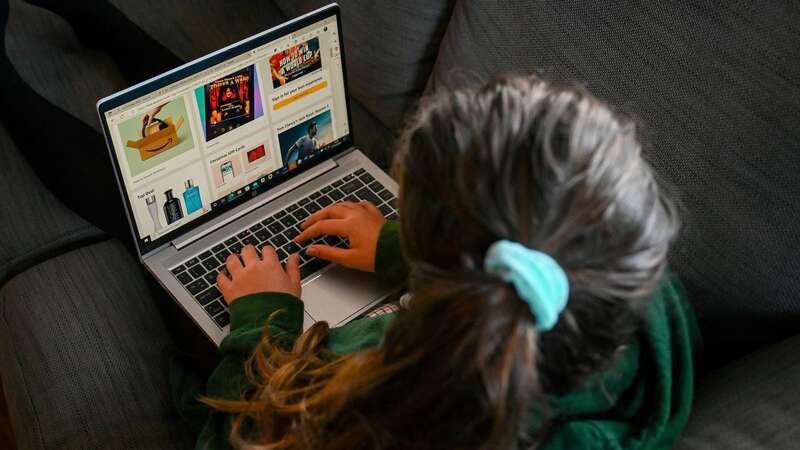
A third of parents have ended up being much stricter with their children than they ever expected, especially when it comes to navigating the perils of the internet.
According to a survey of 1,000 mums and dads with kids aged six to 16, over half (55%) had pictured themselves as 'cool and carefree' parents. However, the reality has proven quite different for many.
The study revealed that 30% of these parents felt compelled to alter their parenting style due to their children's extensive online presence.
Moreover, a whopping 79% have adopted a 'better to be safe than sorry' attitude to protect their children's digital interactions.
Interestingly, while 35% of parents are more comfortable granting their kids freedom in the physical world when they're out with pals, only 11% feel the same about their online independence.
 Baby name expert shares rare vintage names she expects to make a comeback soon
Baby name expert shares rare vintage names she expects to make a comeback soon
Yet, despite these concerns, an overwhelming 93% believe it's crucial to foster a sense of autonomy in their offspring, even though 85% admit to struggling with striking the right balance.
Professor Sam Wass, a developmental cognitive neuroscientist collaborating with the parenting app Findmykids, which initiated the study, commented: "Many parents start off with the intention of being cool and carefree, imagining a relaxed approach to raising their children."
He added: "Parents understand real-world risks because we experienced them ourselves as children."
"But the online world nowadays is so different to what we experienced when we were children that it's easy to panic."
"In the online world though, just as real-world play, there is evidence that over-protecting children, and stopping them from experimenting with risk themselves, can lead to children not having a chance to learn for themselves what's safe and what's not."
"Believe it or not your children want to have fun - but they don't want themselves to get hurt either."
"It's only by learning to judge risks for themselves that they'll gain the capacity for independence."
The study revealed that 38 per cent of parents feel they are more aware of the dangers facing children than they initially thought.
Meanwhile, 30 per cent of those with concerns are anxious about the amount of time their kids spend online.
A significant 45 per cent have attempted to implement a 'Tech-Free Parenting' style, favouring traditional play and in-person interactions.
 'My wife wants to change our four-year-old's name but I think it is too late'
'My wife wants to change our four-year-old's name but I think it is too late'
Conversely, 41 per cent identify as 'Tech-Savvy Parents', who are open to using educational apps and digital tools when necessary.
And 32 per cent admit to being 'Helicopter Parents', keeping a close watch on all of their children's activities, both in the digital realm and beyond.
Nearly six out of 10 (58 per cent) believe they enjoyed more independence in their youth than their children do at the same age.
For 61 per cent, the online threats simply weren't present during their childhood, as per the statistics from OnePoll.com.
While 58 per cent feel it was safer on the streets, and 35 per cent were lucky enough to be raised in what they considered a 'safe' neighbourhood.
A spokesperson from Findmykids stated: "It's not surprising to see nearly a third of parents describe themselves as 'Helicopter' types."
"Children are the most valuable and precious thing in the world, and so obviously you want to keep them safe at all times."
"But insulating them from every mistake can be harmful in the long run and leave them lacking critical understandings of the world."
"Should parents know where their children are at all times, once they reach a certain age? These are questions only each parent can answer for themselves."
PROFESSOR SAM WASS' TIPS TO RAISE INDEPENDENT CHILDREN:.
1. Feel the fear and do it anyway:.
When they're about to do something risky, whether it's real-world or online, sit down beforehand and talk through what could go wrong and what the consequences might be but crucially, don't let that stop them from doing that.
Helping them to think in advance about what the different risks are, and that they, not you, will be responsible for keeping themselves safe, is the first step on the pathway to independence.
2. Real-world risky play is important:.
The reason that children enjoy online risky play while gaming is because actions don't often have real consequences. But it's in the real world, where actions do have consequences, children stand to learn much more.
You shouldn't eliminate all risk, but rather help children distinguish between minor risks and serious ones that should be avoided at all costs.
3. Understanding online risks:.
It's crucial to educate yourself about the potential dangers online and understand the likelihood of each risk.
Just like in real-world play, there are minor potential risks that serve as learning experiences, encouraging you to be more cautious next time. Then there are other, much rarer, types of risk that you want to avoid at all costs.
4. Pretend to trust them more than you actually do:.
Once they comprehend what could go wrong and what they should do if it does, then indicate that you're letting them roam free and it's their responsibility to stay safe.
A tracking app can provide peace of mind it's much easier for you to let them feel independent if you know you have a safety net.
5. Discuss what happened once they return:.
Post-event discussions are vital to help your child develop self-awareness and reinforce their learning.
Instead of being judgmental, ask for their own opinions. It's surprising how often a child will confess that they felt scared or regretful that's when you can be certain they've truly learnt something and are on the path to independence.
Read more similar news:
Comments:
comments powered by Disqus
































